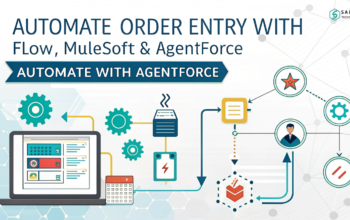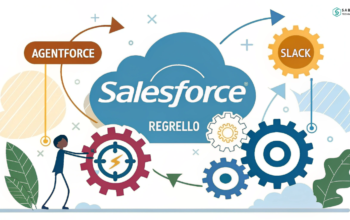Compare Salesforce Marketing Cloud with HubSpot for your marketing automation needs. Discover key differences, features, and benefits to help marketing teams and CRM decision-makers choose wisely.
Marketing automation isn’t just a buzzword anymore—it’s the backbone of successful campaigns. But when it comes to choosing the right platform, the decision isn’t always easy. For marketing teams and CRM decision-makers, two names usually dominate the conversation: Salesforce Marketing Cloud and HubSpot.
Let’s peel back the layers and give you a clear, no-nonsense comparison to help you pick the one that aligns with your business goals.
Understanding the Basics
Before we get into features and pricing, let’s first clarify what each platform is at its core.
What is Salesforce Marketing Cloud?
Salesforce Marketing Cloud is a robust, enterprise-grade platform designed for complex marketing operations. It’s tailored for businesses looking to personalize every interaction across multiple channels like email, SMS, social, and even offline.
What is HubSpot?
HubSpot is an all-in-one marketing automation platform favored by small to mid-sized businesses. Known for its ease of use, HubSpot blends marketing, sales, and customer service tools into a single, unified experience.
Both platforms promise results—but how they get you there is where things get interesting.
Feature Comparison: Salesforce Marketing Cloud vs HubSpot
1. Ease of Use
- HubSpot: Known for its intuitive dashboard and user-friendly interface. Even non-technical marketers can get started quickly.
- Salesforce Marketing Cloud: Offers more depth, but with that comes a steeper learning curve. It’s powerful, but it may take time to master.
Verdict: If your team is lean and you value simplicity, this one takes the lead. But for larger teams willing to invest in learning, the other delivers unparalleled customization.
2. Automation Capabilities
- Salesforce Marketing Cloud: Provides highly advanced automation with Journey Builder. You can design intricate, multi-step campaigns that respond to customer behavior in real-time.
- HubSpot: Automation is straightforward and ideal for lead nurturing and email sequences, but it doesn’t offer the same granularity as Salesforce.
Verdict: Need deep segmentation and branching logic? Salesforce wins. Need quick, effective workflows? HubSpot might be your match.
3. CRM Integration
- Salesforce Marketing Cloud: Seamlessly integrates with the Salesforce CRM, providing a unified view of customer interactions across marketing and sales.
- HubSpot: Has its own CRM baked in, making it ideal for teams looking for an all-in-one package without extra integration headaches.
Verdict: If you’re already embedded in the ecosystem, going with this option makes logical sense.
4. Analytics & Reporting
- Salesforce Marketing Cloud: Delivers granular, customizable reports with AI-powered insights via Einstein Analytics.
- HubSpot: Offers clean, straightforward reporting that’s great for general overviews but may lack depth for advanced data enthusiasts.
Verdict: Data nerds will lean toward Salesforce. Busy marketers needing quick insights will prefer HubSpot.
5. Pricing
- Salesforce Marketing Cloud: Higher upfront costs but justified by advanced features. Best suited for enterprise-level organizations.
- HubSpot: Offers a free tier and reasonably priced plans that scale with your needs, making it attractive for smaller businesses.
Verdict: Bigger budget? Salesforce. Want to start small and grow? HubSpot fits.
Which One Should You Choose?
The choice between Salesforce Marketing Cloud and HubSpot ultimately boils down to your specific goals, team size, and technical capacity.
| Feature | Salesforce Marketing Cloud | HubSpot |
| Ease of Use | Moderate to Complex | Beginner-Friendly |
| Automation Power | Highly Advanced | Simple & Effective |
| CRM Compatibility | Best with Salesforce CRM | Native HubSpot CRM |
| Analytics | Customizable, AI-driven | Easy, Visual |
| Cost | Enterprise Level | Affordable, Scalable |
Still torn? Let’s break it down further.
Why Choose Salesforce Marketing Cloud?
- You manage enterprise-level campaigns.
- Your business requires advanced automation.
- You want complete control over customer journeys.
- You’re already using Salesforce CRM.
- You’re data-driven and want AI-powered insights.
Why Choose HubSpot?
- You’re a startup or mid-sized business.
- You want quick wins with marketing automation.
- You value simplicity and fast onboarding.
- You want one platform for CRM, marketing, and sales.
Real-World Scenario
Imagine you’re running a multinational retail brand with multiple customer touchpoints across online and offline channels. In this case, the platform gives you the flexibility to map each customer journey in fine detail.
Now imagine a SaaS startup launching its first inbound marketing campaign. Here, HubSpot’s simplicity and all-in-one nature reduce headaches while delivering solid results.
Making the Right Choice
Both Salesforce Marketing Cloud and HubSpot bring powerful tools to the table. But your choice should match your team’s capacity, budget, and growth aspirations. Enterprise players usually lean toward Salesforce for its customization. Startups and mid-sized businesses often opt for HubSpot’s ease and affordability.
In the end, the right platform isn’t just about features—it’s about how those features help you meet your goals.
Final Thoughts
Marketing automation isn’t one-size-fits-all. That’s why comparisons like this are essential. Choose this platform if you’re ready to go big and deep. Pick the other if you prefer simplicity with room to grow.
FAQs
1. Is Salesforce Marketing Cloud better than HubSpot for small businesses?
Not necessarily. HubSpot tends to be better suited for small businesses due to its ease of use and affordable pricing.
2. Does HubSpot integrate with Salesforce CRM?
Yes, but the integration may require some technical setup. If you’re already using Salesforce products, the experience tends to be more seamless.
3. Can I use both Salesforce Marketing Cloud and HubSpot together?
Technically yes, but it’s usually overkill unless you have a specific use case requiring distinct functionalities from both platforms.
4. Which platform offers better email marketing features?
One platform offers advanced segmentation and personalization, while the other keeps things simple yet effective for most campaigns.
5. How steep is the learning curve for Salesforce Marketing Cloud?
It’s steeper than HubSpot’s, but the trade-off is more powerful and customizable features.
Feeling more like puzzles than solutions? That’s when Sababa steps in.
At Sababa Technologies, we’re not just consultants, we’re your tech-savvy sidekicks. Whether you’re wrestling with CRM chaos, dreaming of seamless automations, or just need a friendly expert to point you in the right direction… we’ve got your back.
Let’s turn your moments into “Aha, that’s genius!”
Chat with our team or shoot us a note at support@sababatechnologies.com. No robots, no jargon, No sales pitches —just real humans, smart solutions and high-fives.
P.S. First coffee’s on us if you mention this blog post!



